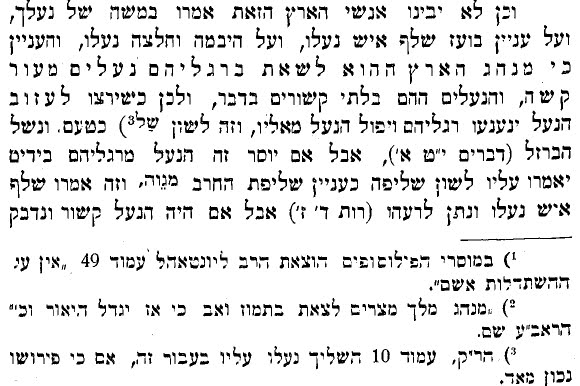Post: Rashi on just what Pharaoh was doing at the bank of the Nile:
| 15. Go to Pharaoh in the morning; behold, he is going forth to the water, and you shall stand opposite him on the bank of the Nile, and the staff that was turned into a serpent you shall take in your hand. | טו. לֵךְ אֶל פַּרְעֹה בַּבֹּקֶר הִנֵּה יֹצֵא הַמַּיְמָה וְנִצַּבְתָּ לִקְרָאתוֹ עַל שְׂפַת הַיְאֹר וְהַמַּטֶּה אֲשֶׁר נֶהְפַּךְ לְנָחָשׁ תִּקַּח בְּיָדֶךָ: | |
| behold, he is going forth to the water: to relieve himself, for he had deified himself and said that he did not need to relieve himself; so, early in the morning he went out to the Nile and there he would perform his needs. — [from Mid. Tanchuma, Va’era 14; Exod. Rabbah 9:8] | הנה יצא המימה: לנקביו, שהיה עושה עצמו אלוה ואומר שאינו צריך לנקביו ומשכים ויוצא לנילוס ועושה שם צרכיו: |
This midrashically-based peshat solves an issue, namely what Pharaoh was doing going out to the water. It explains it by paying careful attention to baboker, and perhaps to the word יֹצֵא in יֹצֵא הַמַּיְמָה. And as I've argued in the past, to the subtle implications of in וַיִּפֶן פַּרְעֹה וַיָּבֹא אֶל בֵּיתוֹ pasuk 23, where that word implies relieving oneself.
Besides working to clarify the minimally interesting peshat question of just what Pharaoh was doing at the river that morning, the midrash works to provide insight into Pharaoh's motivation and character. Though he knew he was human, he wanted others to perceive him as a deity. And this might give us insight into his responses to Moshe and refusal to bend and bow to Divine will.
Other medieval commentators would not necessarily adopt the midrashic explanation as most plausible, as the reason Pharaoh went out in the morning to the Nile. They might turn to historical explanations for this conduct of kings. Their conclusions might not give insight into Pharaoh's character and motivation the same way that a midrash almost always will.
Thus, Rashbam writes:
פסוק טו
הנה יוצא המימה -
כדרך השרים לטייל בבקר ולרכוב אנה ואנה.
הנה יוצא המימה -
כדרך השרים לטייל בבקר ולרכוב אנה ואנה.
Princes and kings like traveling about in the morning, riding here and there. This provides a good explanation, and makes it a kingly thing to do, but it certainly doesn't seem to provide insight into his character. Which is fine.
Ibn Ezra also turns to realia, and what he knows of the conduct of the kings of Egypt in particular; and he sees to tie it in to the affairs of the state.
[ז, טו]
לך אל פרעה בבקר -
מנהג מלך מצרים עד היום לצאת בתמוז ואב, כי אז יגדל היאור לראות כמה מעלות עלה, וצוה השם למשה שילך בבקר ויעמוד לפני היאור ויעש האות שהוא מכת היאור לפני פרעה. וצוהו לקחת המטה אשר נהפך לנחש על ידי משה לפני לכתו אל פרעה. ויתנהו אל אהרן לנטותו על מימי מצרים, שיראה פרעה בעיניו כי מרגע שיכה אהרן במטה על היאור אז יהפך לדם.
לך אל פרעה בבקר -
מנהג מלך מצרים עד היום לצאת בתמוז ואב, כי אז יגדל היאור לראות כמה מעלות עלה, וצוה השם למשה שילך בבקר ויעמוד לפני היאור ויעש האות שהוא מכת היאור לפני פרעה. וצוהו לקחת המטה אשר נהפך לנחש על ידי משה לפני לכתו אל פרעה. ויתנהו אל אהרן לנטותו על מימי מצרים, שיראה פרעה בעיניו כי מרגע שיכה אהרן במטה על היאור אז יהפך לדם.
It is the custom of the king of Egypt until today to go out in Tammuz and Av, for then the river swells, in order to see how many degrees it raised. And Hashem commanded Moshe to go in the morning, stand before the river, and perform the sign, which was the smiting of the river, before Pharaoh.
With this, Ibn Ezra explains the narrative on the basis of contemporary practice in Egypt, which he assumes went back to Biblical times. And it also works nicely as a point in further understanding the implications of the narrative. This is an additional plot point.
Ibn Caspi traveled to Egypt to learn from descendants of the Rambam. He was disappointed in that regard, but he did come away with knowledge of Egypt.
"I saw the custom of the king of Egypt, even today, that two times a week, namely Tuesday and Saturday, the king of Egypt goes out with his chariots and men, in a known place at the riverbank, to play there all day with a small ball. And perhaps Moshe was not able to speak with Pharaoh except on those days, for on the other days he {=Pharaoh} say in his chamber. And even though it does not mention this always {in every instance of Moshe and Pharaoh meeting}, it is sufficient if it mentions it in a few of them, by way of example. And therefore this was Moshe's order, for since Pharaoh was standing on the riverbank with his {?} tent on those days, Moshe would go by way of the waters in a small boat and positioned himself towards him within the boat."
In his sefer Tirat Kesef, Ibn Caspi expands on his travels to Egypt, as well as elaborating the realia informing correct peshat in the pesukim. Whether or not this approach yields the true meaning, all this represents another way of discovering intent in Scripture, by looking at the world outside the text. Ibn Caspi writes:






No comments:
Post a Comment